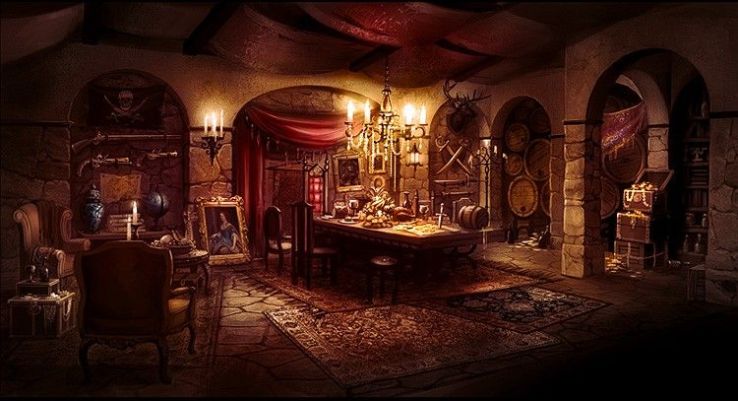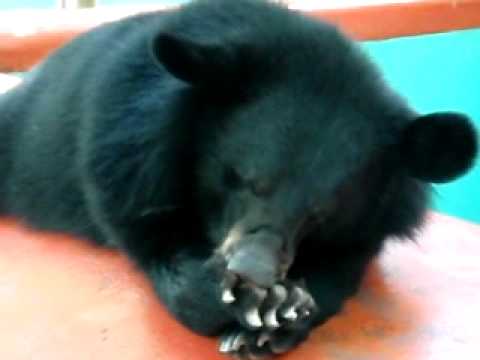Ah, and here we pull back a bit from grand philosophy and sociology.

This chapter touches merely on the domestic arrangements of the Pequod, in particular the culinary. Also, it’s just more of a fun read, and less of a confusing slog. Compared to the last chapter, this one will zip right by in a flash.
SUMMARY: Ishmael describes the eating arrangements of the officers and harpooneers of the Pequod. The captain and his three mates always dine together, in Ahab’s cabin. Ahab is the first to descend, followed by Starbuck, then Stubb, and finally Flask. They are served their food in the same order, the meat cut up by Ahab himself. They must then depart in reverse order, with Flask leaving first and Ahab last. Afterwards, the harpooneers eat in the same cabin, being technically ranked above mere common sailors. Their meal is carefree and raucous, and they delight in teasing the fearful, pallid steward, nicknamed Dough-boy. The officers and harpooneers live in the aft cabin as well, but it truly belongs to Ahab. They merely go there to sleep.
Like I said, eating arrangements. But beyond being mere trivia, and it is rather interesting on its own to be fair, it also gives a bit of insight into the character of the three mates, as well as the harpooneers. And introduces a new member of the crew: the poor, put-upon steward Dough-boy.
It’s interesting the way the dinner plays out a bit like an elaborate game. But isn’t that the way most social conventions seem, when you are removed from their particular context? The way the four officers slowly make their way down for dinner is as comical as it is revealing of their personalities.
Ahab, as Ishmael has described him, doesn’t care much for ceremony or deference. He’s busy taking a measurement of the latitude (in one of the whale boats, hanging off the side of the ship) when called by the steward. He makes absolutely no acknowledgement, finishes his business, and then decides to head down as if it were his own idea, passing on the message to the first mate on his way.
The first mate practices his own careful form of nonchalance. Taking a tour around the ship to make sure everything is in order, before heading down himself. Giving Ahab enough time to be get down the stairs and be seated, comfortably, so as not to hurry an officer of higher rank. After taking one final look at the binnacle, just to be absolutely sure it will be fine without his personal presence, he makes for the cabin, passing the message along to Stubb.
The second Emir lounges about the rigging awhile, and then slightly shaking the main brace, to see whether it will be all right with that important rope, he likewise takes up the old burden, and with a rapid “Dinner, Mr. Flask,” follows after his predecessors.
But it’s the third mate whose character is most elucidated in this particular chapter. After his superiors have all descended, it is like a spell is broken over tiny Flask. He starts running around and dancing, telling jokes to the sailors, having the time of his life for just a few minutes. Then, just before he enters the cabin to eat, he must take on his serious, subservient nature again.
But ere stepping into the cabin doorway below, he pauses, ships a new face altogether, and, then, independent, hilarious little Flask enters King Ahab’s presence, in the character of Abjectus, or the Slave.

So, what do we get from all this?
What we’ve been told of Ahab is borne out by his actions. He is only here to do his job, and takes everything else for granted. His work is the only important thing, he doesn’t care about anything or anyone else. Already, his mind has been seized by monomania, a singular focus of his whole mind. Mastery of the ship is obvious, and doesn’t need to be reinforced with petty social games.
Starbuck feels the most responsibility for the ship itself, along with the crew. The role he plays is that of a caretaker, watching over the progress to the last possible moment. Checking the arrangements of the crew, the direction of the ship, everything, before taking his leave.
The second mate, as we’ve seen, takes everything in stride. This is all just part of some big joke to him, as long as his personal honor isn’t on the line. He does everything casually, including going down for dinner. But even he has been made to respect the great and powerful Ahab, as we see when dinner is finally served.
And last, and certainly least, is Flask. He is a man repressed, fully feeling the weight of his position. But it’s all unspoken! Nobody ever bothers to actually put him down or ruin his fun. It’s just known that a third mate shouldn’t be acting the way he does. Flask is the most susceptible to social pressure of all of them, and suffers the most for it.
We see that even more in the actual dinner scene. Flask is served last, and must stop eating first, as soon as Ahab is finished. He even denies himself butter, on account of not feeling worthy of it in some unspoken way.
Whether he thought the owners of the ship denied it to him, on account of its clotting his clear, sunny complexion; or whether he deemed that, on so long a voyage in such marketless waters, butter was at a premium, and therefore was not for him, a subaltern; however it was, Flask, alas! was a butterless man!
The whole meal is taken in solemn silence. Ahab doesn’t care to be social with his inferiors, so nobody is allowed to talk. Even in the relatively relaxed atmosphere of a whaling voyage, nobody is allowed to act against a captain’s implicit wishes. Even though Ahab himself wouldn’t care a bit if his mates did want to have a little chat over dinner, it simply isn’t done.
This brings to mind, for me, the way that Ahab’s power is portrayed, at this stage at least, as unthinking. The captain isn’t really focused on what’s happening around him, but instead on his own plans and internal strife. All he has to do is appear to be serious and grim, and the rest gets done automatically. It is all implicit power, all social power. He doesn’t need to run around yelling at the crew, he has people to do that for him. The very position of being captain provides him half of his grandeur, and being Ahab provides the rest.
At a certain point, I’m going to have to talk about how much of this tragedy was caused by one man’s madness, and how much is the result of social machinery gone awry. This probably isn’t the time, but it’s something to keep in mind. The forces that put Ahab in a position to have the power to do what he does, what accountability do they hold? Can they even be personified? It’s hard to say, for sure.
Anyway, the harpooneers come in and they just have a grand old time. Just eatin’ lots of food and playing jokes on the steward as they go. They all come from different cultures, and barely even share a language, much less complex customs like the officers go through. Again, we see that the so-called “savages” have an easier, more enjoyable time in the world, overall.
We also get a bit more about Daggoo, the African harpooneer, appearing regal and refined. He doesn’t even eat very much, and does so only in small bites. The implication with his character, it seems to me, is that the refinements of civilization are not limited to those who happen to be on top, any more than greatness is. Royal power is not something conferred by birth, but by action and attitude.
There is some sort of deep argument here about the nature of civilization and nobility that I’m still trying to parse. I used to think it was just the simple “democracy of nature” thing, where Ishmael/Melville prizes abilities over birth status. But perhaps it’s better to say that nobility does exist, but exists everywhere in the world, in an unorganized way. Any person could have it within them, only needing the right conditions to bring it out.
Anyway, this wouldn’t be a chapter of Moby-Dick; or, the Whale if we didn’t end things with Ishmael getting poetic about Ahab, and using an exclamation point!
Though nominally included in the census of Christendom, he was still an alien to it. He lived in the world, as the last of the Grisly Bears lived in settled Missouri. And as when Spring and Summer had departed, that wild Logan of the woods, burying himself in the hollow of a tree, lived out the winter there, sucking his own paws; so, in his inclement, howling old age, Ahab’s soul, shut up in the caved trunk of his body, there fed upon the sullen paws of its gloom!
So, some foreshadowing about Ahab abandoning his faith in God, and a weird analogy about bears.

You see, in olden times people didn’t have a lot of… what you’d call… “accurate” information about most animals, and especially big scary ones like bears. It was many years before naturalists were able to discover all the secrets of their domestic lives. Particularly with regards to their biology and particular habits, there are a lot of weird ideas that went around for many hundreds of years before finally being disproven.
One particularly stubborn one is bears sucking on their paws to survive. People knew that bears hibernated, they went off somewhere for the winter and weren’t seen until the spring. So how did they survive? Somehow, people got the idea that they crushed up food into their paws, and then sucked the nourishment out over the winter. They’re actually just trying to toughen up the new skin on their paws, after the calluses come off over the long winter of inactivity. They just, like, eat a lot in the fall, and store it as fat for the winter.
The analogy is pretty clear, though. Self-sufficiency and isolation are Ahab’s lot in life, at least for now. He has no use for human company.
And thus, the meal is ended.
Next up, we’re putting our heads in the clouds, and getting hell of philosophical. It’s another fun one, but it’ll take a bit of work to figure out completely.
Until next time, shipmates!
